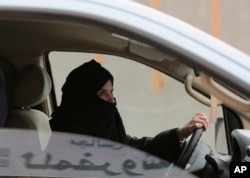Cindy Saine at the State Department and Edward Yeranian in Cairo contributed to this report.
Saudi Arabia has arrested at least eight writers and activists, including two who hold dual U.S.-Saudi citizenship, in the latest crackdown on supporters of female activists.
Rights workers say the detained have all expressed support for a group of Saudi women activists, now on trial for allegedly defaming the kingdom over its treatment of women.
The U.S. State Department has confirmed the arrest of two Americans. A spokesperson said the State Department is working "to provide all appropriate consular assistance and seek access to the citizens without delay."
ALQST, a London-based human rights group, says all those arrested were "writers and social media bloggers previously engaged in public discourse on reforms."
Most of the detainees were arrested Thursday.
Two Americans
Badr al-Ibrahim, a writer and physician, is one of the two U.S.-Saudi nationals arrested.
The other American detainee is Salah al-Haidar, the son of Aziza al-Yousef, an activist who was temporarily released last week but remains on trial along with other female campaigners. The activists have been imprisoned for nearly a year and have allegedly been subjected to torture and sexual abuse.
Women's rights
The women on trial had campaigned for the right to drive and an end to the kingdom's male guardianship system.
Egyptian political sociologist Said Sadek tells VOA that charges of human rights abuses are common in the Middle East, but much of the time it does not lead to a change in bilateral relations.
"The issue about human rights has always been a problem all over the area, but what is to be done? It has been raised a lot, and I don't see that it has been affecting any bilateral relations, just noise and nothing happens," he said.
The arrests coincide with a vote Thursday by the U.S. Congress to cut American support for the Saudi-led coalition in Yemen. U.S. President Donald Trump has yet to indicate if he will veto the bill.
Several analysts in the Arab media tied Friday's arrest of Saudi activists to the vote by the U.S. Congress.
Khashoggi factor
Khattar Abou Diab, who teaches political science at the University of Paris, says the Saudis accuse the arrested activists of activities that would damage the security of the country, which is a theme one hears frequently in the Middle East. More importantly, though, relations between the U.S. media, Congress and Riyadh have turned sour, creating a climate of mistrust that instead is pushing Riyadh to strengthen ties with Moscow.
Abou Diab points out that Riyadh has been threatening, along with Russia, to stop using the dollar as the base of oil trade conducted by OPEC member-states. Saudi activist Ali Shihabi tweeted Friday it is “unlikely that Riyadh would ditch the dollar,” but noted that such a move would “weaken Washington’s clout in global trade,” if it were to happen.
Giorgio Cafiero, who heads Gulf State Analytics in Washington, tells VOA, “Saudi Crown Prince Mohammed Bin Salman [MBS] has been suffering from an extremely tarnished reputation in Washington and other Western capitals ... [since] the killing of [Saudi journalist] Jamal Khashoggi [in October, in the Saudi consulate in Istanbul].
“Without a doubt,” he insisted, “the new detentions [of rights activists] illustrate MBS’ determination to resist pressure created by global outcries over human rights abuses in Saudi Arabia.”







